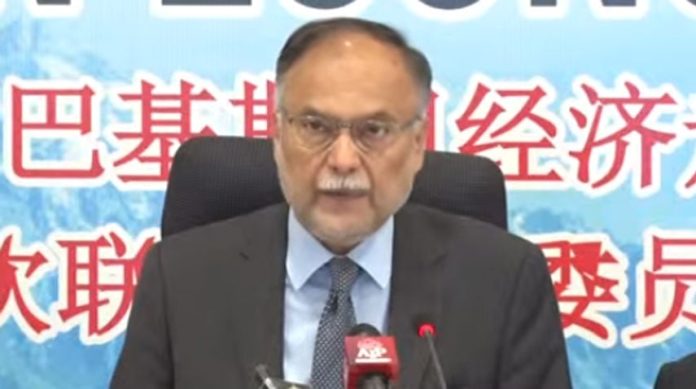——- Hyd-Sukkur motorway, Wangu Hills tunnel on M-8 among proposed projects
By Anzal Amin
ISLAMABAD: Minister for Planning and Development Ahsan Iqbal said on Friday that the country’s power sector can expect another $4 billion investment through the China-Pakistan Economic Corridor (CPEC).
Addressing the virtual meeting of the 13th Joint Cooperation Committee (JCC), the minister said the additional investment is in the last stages of finalization. The JCC is the main decision-making body for CPEC, which convenes annually.
The Pakistani side was headed by Iqbal while the Chinese team was led by the chairman of Beijing’s National Development and Reform Commission (NDRC).
Iqbal emphasized that the previous year marked a decade of high-quality development since CPEC’s – a flagship project of China’s Belt and Road Initiative – inception in 2013.
The minister announced the addition of five new corridors focusing on growth, livelihood enhancement, innovation, green initiatives, and regional connectivity.
He expressed Pakistan’s appreciation for China’s vision in updating the second phase of CPEC with the new corridors.
The planning minister reiterated Pakistan’s readiness to collaborate with the NDRC to achieve “China and Pakistan’s shared vision of high-quality development”.
Since its inception CPEC has made steady progress, said Iqbal and highlighted that 16 energy projects have generated more than 8,000MW of electricity.
He also outlined plans for CPEC, noting that the Suki Kinari Hydropower Project is under construction and expected to be commissioned later this year.
Iqbal also announced three power projects including two hydel and one coal-based in Gwadar, which are expected to generate 2,100MW of energy with a combined worth of $4 billion.
“An in-depth study is underway to shift from imported to local coal for coal-based power generation,” the federal minister noted.
“This shift is expected to reduce Pakistan’s import bill and facilitate payments to Chinese companies,” he added.
Eight projects worth $6.7 billion have been completed in the transport sector, including roads and the Gwadar International Airport, which is expected to be operational this year.
He added that CPEC has contributed to 888 km of motorway and highway construction, which both Pakistan and China have financed.
The minister said currently 853 km of roads are under construction through local financing.
Iqbal mentioned several projects ready for bidding by Chinese companies and expressed hope for the immediate start of the process for the Main Line-1 (ML-1) project, the country’s largest railway scheme.
The minister further said that the “re-modified PC-1 for the upgrade of Pakistan Railways existing ML-1 and establishment of a dry port near Havelian” is proposed to be financed through foreign funding under the CPEC framework agreement.
He requested the NDRC and National Railway Administration to authorize the bidding process and establish timelines for groundbreaking.
Referring to the Karachi Circular Railways (KCR) project, he noted its expected implementation under a government-to-government (G-to-G) arrangement similar to the Lahore Orange Line Metro project.
The minister announced Pakistan’s proposal of two projects for CPEC financing including the Hyderabad-Sukkur motorway and the Wangu Hills tunnel project on the M-8.
The planning minister also maintained that the Gwadar port is operational along with several other infrastructure and social projects.
“We deeply acknowledge Chinese support in socio-economic projects, which have increased the livelihood of our people,” said Iqbal.
He emphasized the transition from G-to-G to business-to-business (B-to-B) collaborations in the next phases, focusing on high-quality development and transforming Gwadar into a business district and added that progress is ongoing in developing four priority special economic zones (SEZs).
Iqbal stressed the need to replicate Chinese expertise in setting up these SEZs, requiring support from technical experts facilitated under the recently signed industrial cooperation framework agreement.
He invited Chinese manufacturers to relocate to these SEZs to benefit from Pakistan’s low-cost labour force, high return on investment, and easy access to global markets.
Iqbal also discussed multiple agreements to promote agricultural commodities to China and announced that Chinese agricultural companies have established seven production facilities, including cattle and crop farming.
The minister highlighted the challenges posed by climate change to current agricultural practices and proposed an MOU for agricultural research cooperation and capacity building to modernize agriculture and enhance productivity.
The security of Chinese individuals and projects was on the agenda of the virtual meeting of the JCC on CPEC between the two countries today.
Prime Minister Shehbaz Sharif is expected to travel to China in the first week of June as part of his government’s efforts to seek greater cooperation from Beijing to pull the country out of economic troubles.



